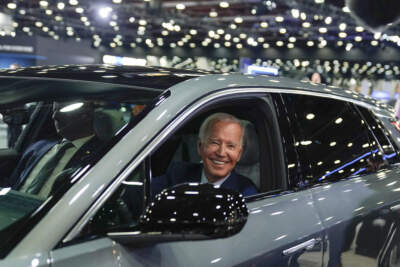Advertisement
Commentary
Electric vehicles are caught up in the culture wars, but the climate doesn’t care how you vote

Climate change solutions rest on three pillars: technology, economics and politics. The talks currently underway at the COP28 climate summit (officially the Conference of the Parties to the UN Framework Convention on Climate Change) underscore this reality. If one of the pillars is unstable, solutions fall apart.
The transition to electric vehicles (EVs) features the same threefold dependence. The technology of EVs has rapidly advanced, and the economics of EVs have steadily improved. But the politics of EVs remain contentious.
Unsurprisingly, Donald Trump is at the center of this controversy.
Trump has recently come out with some bizarre critiques and wild disinformation about EVs. "If that disastrous federal policy that favors EVs is allowed to stand, the U.S. auto industry will cease to exist, and all American autoworker jobs will be sent to China,” Trump told autoworkers recently, referring to the Biden administration’s EV-friendly Inflation Reduction Act (IRA) signed last year.
The premise behind Trump’s rhetoric is that China, the current world leader in EV manufacturing, stands to gain disproportionately from the electrification of the U.S. auto fleet.
China is the unequivocal frontrunner in global EV production, thanks to years of research and development, largely internal supply chains, and generous government support. With the notable exception of Tesla, all the other automakers are playing catch up. So Trump uses China’s supremacy in battery technology as a fulcrum to leverage xenophobic bias against EVs.
Besides keying into anti-China sentiment, Trump is likely calculating that his vocal disparagement of EVs will tap into a populist vein of anti-environmentalism. Negative attitudes toward EVs correlate with skepticism about climate change, which Trump has repeatedly ridiculed. He can bolster his popularity by reinforcing the political values that resonate with most of his followers. The idea that EVs jeopardize auto industry jobs is a corollary to the broader ideological argument that opposition to fossil fuels is an elitist position championed by an administration out of touch with the working class.
The EV has become a significant marker of political identity, and Trump’s narrative aims to exploit the pronounced red-blue divide in attitudes toward EVs.
The EV has become a significant marker of political identity, and Trump’s narrative aims to exploit the pronounced red-blue divide in attitudes toward EVs. A recent study from the Pew Research Center found EVs at the center of America’s culture war, with Democrats almost three times more likely than Republicans to consider buying one.
The effectiveness of the former president's strategy depends on voters not grasping the inevitability of the shift to electric vehicles. Although EV adoption has been slower than some expected, there is no doubt that the transition is well underway. Nine U.S. states and more than a dozen nations have enacted legislation mandating that all new vehicles sold must have zero emissions by 2035. Virtually all the world’s automakers have roadmaps for converting to electric vehicles within the same time frame. Sales of EVs in the U.S. will exceed 1 million vehicles for the first time in 2023, and consumers will find more affordable EV options are on the way.
The transition will not be seamless, but internal combustion engine cars will be a shrinking minority here in the not-too-distant future. And it will happen even sooner in many Asian and European countries.
The introduction and eventual acceptance of LED lightbulbs bear an apropos analogy to the current state of affairs with EVs. Initially met with resistance due to their higher upfront costs compared to incandescent bulbs, LEDs faced skepticism and opposition when they were first introduced. Government programs promoting their adoption were met with disdain. But as the technology advanced and costs dropped, everyone acknowledged their superior energy efficiency and longevity. A similar trajectory is likely for EVs. As EV technology evolves and the manufacturing process matures, production costs will decline, competition will increase and prices will drop.
But even with all the advantages they bring, EVs need government support to dislodge the ubiquitous and deeply embedded internal combustion engine. The industrial policy implemented under Biden addresses the crucial prerequisites: incentives for the manufacture and purchase of EVs, subsidies for building out charging infrastructure, and policies to establish secure and environmentally sound supply chains.

If Biden’s policies stay on the books, U.S. automakers will be able to gain a solid foothold in the worldwide EV market. But Trump has vowed to gut the IRA if he is reelected. That would leave U.S. automakers ill-equipped for global competition, thereby ceding future dominance to manufacturers in Asia and Europe. U.S. consumers would eventually gravitate to the constantly improving foreign EV models, leading to a steadily declining market share for domestic vehicles. That wouldn’t be good for U.S. workers. And the limits this would put on EV adoption in the U.S. certainly wouldn’t help us meet our carbon reduction goals.
Trump's rhetoric against Biden's support of EVs relies on an ideological blindness. There are long-term geopolitical and economic ramifications of failing to help Detroit establish a presence in a pivotal market where it currently lags behind. An optimist would say the public will see the error and repudiate Trump’s obtuse prescriptions in the voting booth. A pessimist would point out that predictions of Trump's electoral failures have often been wrong, and that it's unlikely EVs will become politically neutral soon.
The political obstacles at COP28 that have mired progress on international agreements mirror the tribal affiliations impeding the adoption of EVs. Denigrating EVs to galvanize political support threatens an essential component of decarbonizing transportation systems.
Climate change is a bipartisan crisis, indifferent to all political colors. We must resist the politicization of the electric vehicle and keep our focus on the goal of a world freed from fossil fuels.
